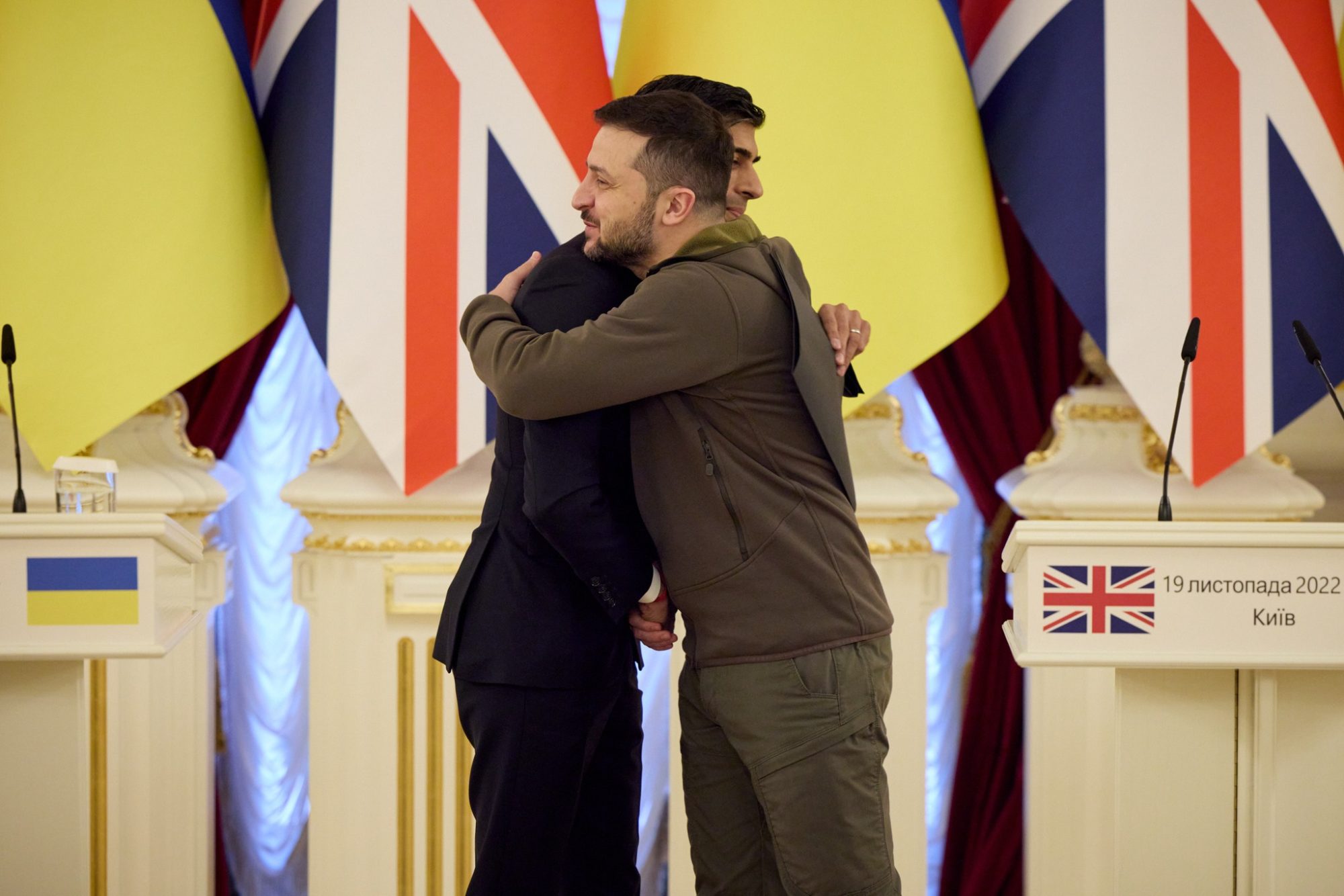
British Prime Minister Rishi Sunak has pledged £50m in air defense aid to Ukraine, GOV.UK confirmed in a Saturday press release. The announcement came as Sunak met with President Volodymyr Zelensky during a surprise visit to Kyiv—his first since becoming PM.
The package, the press release states, is meant to countervail Russian aerial attacks, comprising 125 anti-aircraft guns as well as anti-drone technology (including dozens of radars and electronic warfare capability). Earlier this month, Defence Secretary Ben Wallace announced that the UK would supply Ukraine with 1,000 new anti-aircraft missiles.
The UK has also provided assurances for the training of 10,000 of Ukraine’s armed forces, whether new or existing. Expert army medics and engineers will be sent to the region to offer specialized support. The training program is planned to run for 120 days.
The press release went on to state that Sunak had said it was “deeply humbling” to be in Kyiv and have the opportunity to meet people “paying so high a price to defend the principles of sovereignty and democracy.”
During his visit, Sunak laid flowers for the war dead and lit a candle at a memorial for victims of the 1930s Holodomor famine before meeting emergency workers at a fire station.
The prime minister said that he was “proud of how the UK stood with Ukraine from the very beginning. And I am here today to say the UK and our allies will continue to stand with Ukraine, as it fights to end this barbarous war and deliver a just peace.”
A bi-lingual tweet (one part English, one part Ukrainian) posted on Sunak’s personal account read that “Britain knows what it means to fight for freedom,” and that “we are with you all the way.”
Britain knows what it means to fight for freedom.
— Rishi Sunak (@RishiSunak) November 19, 2022
We are with you all the way @ZelenskyyUa 🇺🇦🇬🇧
Британія знає, що означає боротися за свободу.
Ми з вами до кінця @ZelenskyyUa 🇺🇦🇬🇧 pic.twitter.com/HsL8s4Ibqa
Accompanying the text was what looked like a promotional video of Sunak meeting Zelensky, complete with music used for rousing effect. Presumably, it had been prepared by Downing Street’s PR team in post-haste.
Ukrainian President Volodymyr Zelensky subsequently shared Sunak’s tweet, wrote that he thanked him, and that “with friends like you by our side, we are confident in our victory. Both of our nations know what it means to stand up for freedom.”
Thank you, @RishiSunak. With friends like you by our side, we are confident in our victory. Both of our nations know what it means to stand up for freedom 🇺🇦🇬🇧 https://t.co/9oFfswxp3K
— Володимир Зеленський (@ZelenskyyUa) November 19, 2022
Following the meeting, on his Telegram channel Zelensky wrote: “since the first days of the war, Ukraine and the UK have been the strongest of allies.”
For weeks now, Russian air assaults have been wreaking havoc on Ukrainian infrastructure. According to Kyiv, these have now destroyed nearly 50% of the country’s energy infrastructure, leaving 10 million Ukrainians without power. Only last week, in what was its heaviest barrage yet, Russia fired more than 100 missiles at Ukraine’s power facilities, Prime Minister Denys Shmyhal said yesterday, November 19th. Kyiv authorities have warned that the city could face a “complete shutdown” of its power grid.
With the first snow having fallen and winter fast approaching, the UN has sounded the alarm that Ukraine’s continued electricity and water shortages might soon bring humanitarian disaster. To counteract such a scenario, the EU pledged on Thursday, November 17th that it would provide temporary cold-weather shelters, generators, and electricity grid-repair kits.
Yet those might not prove enough. Indeed, the situation has become so dire that today, November 19th, the head of Ukraine’s biggest private energy firm, DTEK’s Maxim Timchenko told the BBC that if Ukrainians “can find an alternative place to stay [outside Ukraine] for another three or four months, it will be very helpful to the system.”
Even if material help brings stability to Ukraine’s energy grid, it remains vulnerable to Russian air attacks. Prime Minister Sunak’s pledge for concrete military defense, then, is somewhat of a life-raft for Kyiv, though ideally, it wants a NATO-enforced closure of Ukraine’s airspace. That solution, however, might trigger open conflict between NATO and Russia (both nuclear powers) and has not been pursued as of yet.
Coming second only after the U.S., the UK is currently the largest provider of military aid to Ukraine. So far it has committed about £2.3bn and has pledged to match that amount in 2023, according to the House of Commons library. By way of comparison, the EU has committed €3.1 bn (£2,697,651 bn).
With his visit and assurance of support, Sunak appears to aim for continuity, in reaffirming the UK’s reputation of being Ukraine’s foremost ally within Europe.
It remains an open question whether he intends to match—or indeed exceed—the commitment shown by fellow Tory and predecessor Boris Johnson: one of the first, as well as the most strident, advocate among world leaders for continued assistance to Ukraine in all ways.
